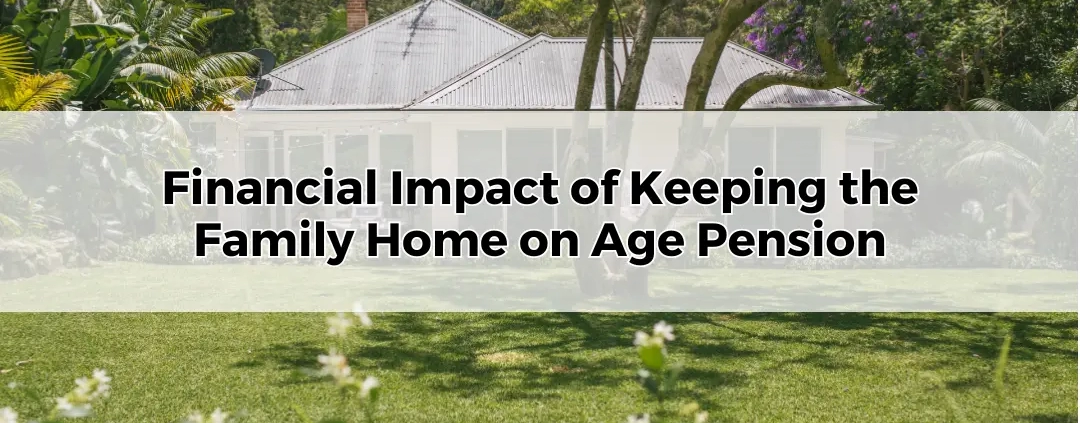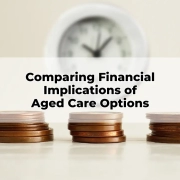Financial Impact of Keeping the Family Home on Age Pension
Table of Contents
ToggleResidential aged care in Australia presents numerous financial complexities, especially when it comes to the family home. The home is often the most significant asset a person owns, both financially and emotionally. Its treatment under government means tests for the Age Pension and aged care fees can dramatically impact an individual’s financial situation.
For many Australians, the thought of parting with the family home is daunting. However, when transitioning into aged care, this decision becomes unavoidable. Whether the home is sold, rented, or retained, each choice carries significant financial implications, not only for the individual entering care but also for their beneficiaries. Understanding the full spectrum of these impacts is vital for making informed decisions that preserve financial stability.
How the Family Home is Treated in Age Pension Eligibility
The family home is one of the few assets exempt from the Age Pension assets test, provided it remains the principal residence. This means pensioners can live in their homes without it affecting their pension entitlements. However, once the transition to residential aged care occurs, the rules change significantly.
For those moving into permanent care, the home remains exempt from the assets test for up to two years. During this period, pensioners can maintain their full pension while deciding what to do with their property. After the two-year mark, the home’s value begins to be assessed, potentially reducing or eliminating pension entitlements depending on the total value of the individual’s other assets. This two-year exemption period provides a window of opportunity for making long-term financial decisions.
Impact of Moving into Residential Aged Care on the Family Home
When an individual moves into residential aged care, the treatment of their family home under Centrelink and aged care assessments changes. While the family home retains its exemption from the Age Pension assets test for two years, after this period, the property is subject to assessment. If the home is unsold or remains unoccupied beyond two years, its value is included in the means test, which can affect both the Age Pension and aged care fees.
For many, the challenge lies in determining the future of the family home—whether to retain it, rent it out, or sell it outright. Each decision carries different financial consequences, especially concerning Age Pension entitlements and ongoing aged care costs. Making the right decision early on can significantly impact long-term financial outcomes.
Understanding Aged Care Means Testing and the Family Home
Aged care means testing is a critical component of determining the fees that residents will pay for aged care services. The value of the family home, however, is treated differently from other assets. A capped value of $206,039.20 (as of 20 September 2024) is included in the means test when assessing aged care fees, regardless of the property’s market value. This cap ensures that homeowners are not disproportionately disadvantaged by owning higher-value properties.
The capped amount only applies if the home is retained. If the individual has a spouse or dependent living in the home, it is fully exempt from means testing. Understanding these rules helps ensure that families make the most tax-efficient and financially sound decisions when managing aged care costs.
Options for the Family Home When Entering Residential Aged Care
There are several options available when deciding what to do with the family home once entering residential aged care: keeping, selling, or renting the property. Each choice has distinct financial, emotional, and tax implications.
Keeping the home provides emotional comfort and a sense of stability, especially if family members continue to live there. However, it may impact ongoing pension and aged care fees. Selling the home frees up capital that can be used to pay a Refundable Accommodation Deposit (RAD) or other care-related expenses, but it can also reduce Age Pension entitlements. Renting the property can generate an income stream but may affect both pension and aged care fees. A careful consideration of each option’s financial outcomes is essential.
Selling the Family Home: Pros and Cons
Selling the family home is often seen as a straightforward solution for funding aged care. It provides immediate access to liquid funds that can be used to pay a RAD or ongoing care fees. However, the sale of the home increases assessable assets, which can reduce Age Pension entitlements. For those with significant home equity, this can result in a loss of part or all of the Age Pension.
On the other hand, selling the home eliminates the burden of property maintenance and provides certainty in managing aged care costs. The decision to sell should be made with careful consideration of its impact on both aged care means testing and pension eligibility.
Income Implications of Renting Out the Family Home
Renting out the family home is an option for those who want to retain ownership while generating an income stream. However, rental income is assessable under the Age Pension income test, which can reduce pension entitlements. Furthermore, the rental income may also be counted when calculating means-tested aged care fees.
While renting the property allows families to maintain control over their asset, the associated costs, such as maintenance, property management, and taxes, need to be factored in. Understanding the tax treatment of rental income and its impact on pension eligibility is crucial for making an informed decision about whether renting is a viable option.
Retaining the Family Home and Paying a RAD (Refundable Accommodation Deposit)
Retaining the family home while paying a RAD presents a balanced option for many families. By using other financial assets or leveraging superannuation to fund the RAD, individuals can keep their family home intact without significantly affecting their immediate liquidity. This strategy allows families to preserve their wealth while ensuring the individual receives the aged care they need.
The RAD is fully refundable upon the individual’s departure from the aged care facility, offering peace of mind. However, it is essential to carefully assess whether enough funds remain to cover ongoing care costs without needing to sell the home in the future.
The Role of the Gifting Rules When Managing the Family Home
Centrelink and aged care gifting rules impose limits on how much individuals can transfer to others without affecting their Age Pension or aged care means tests. The current allowable gift amount is $10,000 per financial year or $30,000 over five years. Gifting amounts above these limits are assessed as if they are still part of the individual’s assets for five years, which can reduce pension payments or increase aged care fees.
Transferring ownership of the family home to children or other relatives may seem like a good way to avoid these assessments, but exceeding the gifting limits can lead to penalties. Understanding the rules and seeking professional advice is crucial when considering property transfers.
Estate Planning Considerations
For many Australians, the family home is the largest component of their estate. Estate planning decisions regarding the family home must take into account not only aged care costs but also the tax implications for beneficiaries. If the home is sold before or after the individual’s death, beneficiaries may be subject to capital gains tax (CGT), depending on the circumstances of the sale and the ownership structure.
Ensuring that the family home is passed on in a tax-efficient manner while also meeting aged care expenses requires careful planning. A comprehensive estate plan that integrates superannuation, aged care, and inheritance objectives can provide peace of mind and financial security for both the individual and their beneficiaries.
Conclusion
Given the complexities surrounding the family home in aged care and pension assessments, seeking professional financial advice is essential. Aged care specialists and financial advisers can help families navigate the myriad of rules, assess the best financial options, and structure their decisions in a tax-efficient manner.
Working with a financial adviser ensures that decisions around the family home are made with a comprehensive understanding of their long-term financial impact. From managing means tests to optimising estate plans, professional advice can help families preserve their wealth while ensuring that aged care needs are met.









